|
|
|
Sort Order |
|
|
|
Items / Page
|
|
|
|
|
|
|
| Srl | Item |
| 1 |
ID:
177673
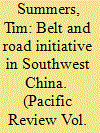

|
|
|
|
|
| Summary/Abstract |
The Belt and Road Initiative (BRI) has been the subject of extensive analysis since late 2013. Most of this views it as a manifestation of China’s approach to global issues under Xi Jinping, whether economic, geopolitical, or as a bid to reshape globalization. There has so far been less research into the domestic dynamics of the BRI, including at the sub-national level in China. Based primarily on an examination of provincial-level policy documents and research, this paper explores the ways in which policy makers in the southwestern province of Yunnan have responded to the BRI, and what this might mean for the implementation and shaping of the initiative. It identifies the promotion of externally-oriented development as the main response in Yunnan to the BRI, structured around the idea of making the province a ‘pivot’ to south and southeast Asia. This provincial-level response is shaped by pre-existing policy goals in Yunnan and reflects more continuity than change in policy substance. This is consistent with interpretations of the BRI as an ‘omnibus’ policy which can incorporate multiple objectives and act as a framework within which provincial actors can compete for influence or which they can use to make progress towards achieving local objectives in the context of national strategy. The paper concludes that in the case of Yunnan and the BRI, broad alignment between provincial and central government objectives suggests that on this issue, Yunnan is more of an ‘influencer’ and ‘interpreter’ than ‘ignorer’ of national policy goals.
|
|
|
|
|
|
|
|
|
|
|
|
|
|
|
|
| 2 |
ID:
177676


|
|
|
|
|
| Summary/Abstract |
This paper analyses the role of Islam in Malaysian foreign relations under the Premiership of Najib Razak. While most observers acknowledge the importance of Islam to Malaysian foreign policy making under Prime Ministers Mahathir Mohamad (1981 to 2003) and Abdullah Badawi (2004 to 2008), they tend to underplay its significance in Najib’s tenure as leader of Malaysia. Departing from this, we suggest that Islam was significant in Najib’s foreign policy in three ways. First, Najib utilized regional and international conflicts involving Muslims, particularly the Rohingyas and Palestinians, in order to construct Malaysia as a guardian of disenfranchised Muslims. Second, Najib relied on the notion of wasattiyah (the middle way) in order to buttress Malaysia’s image as a moderate Muslim country. Finally, Najib rationalized Malaysia’s alignment with Saudi Arabia in the Saudi-Iran geopolitical rivalry in religio-political terms. To make these arguments, we utilize a state identities approach to studying foreign policy. We unpack the notion of Muslim state identity into three manifestations: the activist Muslim state, the moderate Muslim state, and the Sunni Muslim state. The paper draws on both primary and secondary sources. We conclude with the conceptual implications of our argument.
|
|
|
|
|
|
|
|
|
|
|
|
|
|
|
|
| 3 |
ID:
177680
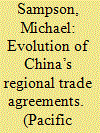

|
|
|
|
|
| Summary/Abstract |
There is a widespread consensus that China’s growing network of regional trade agreements in the Asia-Pacific has crucial strategic and economic implications for states in the region. Yet despite the recognition that China’s agreements are initially limited and then expanded substantially over time, few accounts explore the strategic and economic implications of this aspect of China’s approach. This article addresses this flaw by drawing attention to the relation between regional power dynamics and China’s gradualist approach to negotiating regional trade agreements. It presents a new framework which suggests that due to China’s steadily improving economic position vis-à-vis its regional counterparts and the growing economic dependence of these partners on it, China’s negotiating approach increases opportunities to maximize its growing bargaining leverage and influence over time and thereby improve its regional position still further. This article concludes by drawing out the implications of this for the region.
|
|
|
|
|
|
|
|
|
|
|
|
|
|
|
|
| 4 |
ID:
177672
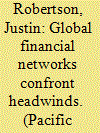

|
|
|
|
|
| Summary/Abstract |
China’s economic ties with the British Virgin Islands (BVI) exemplified global finance beyond national borders in the post-cold war period. This relationship now serves as an example of global finance’s more tenuous foundations as social and political forces coalesce against the offshore economy. The article establishes the defining conflict as the tension between national/global regulations and an Asian-headquartered network that coordinates offshore financial flows. The analysis outlines how the global network connecting Asia to the Caribbean has receded. Several factors are decisive. First, global and national forces are now aligned. Because global regulatory change is predicated on minimum standards only, domestic commitment to global regulatory norms is critical. Domestic commitment to the new international taxation regime is variable but a key development is that many large emerging markets have committed to the effort. China has forcefully imposed new restrictions on the offshore economy, including closing down routes for capital exit. One result is that the BVI–China relationship, after deep financial interconnections, is on a downward trajectory. The larger pattern than deserves further analysis is how action by China—along with India and Indonesia—suggests that substantive reform of the global offshore economy, led by Asian actors, is possible.
|
|
|
|
|
|
|
|
|
|
|
|
|
|
|
|
| 5 |
ID:
177688
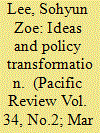

|
|
|
|
|
| Summary/Abstract |
Cross-regional free trade agreements (FTAs) have flourished in East Asia since the late 1990s. Japan and Korea were at the forefront of this trend. Nevertheless, most policymakers’ preferences orbited around region-oriented FTAs out of reluctance to make a sudden policy shift away from their conventional emphasis on World Trade Organization-based multilateral negotiations. The trend continued in Japan throughout the 2000s. In contrast, Korea took a sharp turn toward a cross-regional strategy in 2003. By the mid-2010s, this had created a significant gap in the two countries’ overall FTA partner choices. What caused policymakers’ ideas in the two countries to diverge from their initial focus on region-oriented FTAs? This paper focuses on the conditions that enabled policymakers’ ideas to explain the divergence by developing the contextual‒dynamic framework of FTA policies. At the dynamic level, individuals are more likely to emerge with new ideas when their expertise comes from outside the decision-making body, accompanied by their social qualities and power. Contextual conditions should also be met: the trade policy environment should reciprocate agent-level qualities to create a supportive atmosphere for policy change.
|
|
|
|
|
|
|
|
|
|
|
|
|
|
|
|
| 6 |
ID:
177691
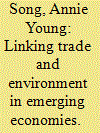

|
|
|
|
|
| Summary/Abstract |
In trade negotiations, developed countries have been frontrunners in advocating environmental protection whereas developing countries were reluctant to link environmental protection to their trade agreements. However, the recent trend of including environmental provisions (EPs) in free trade agreements (FTAs) shows a policy change in some of the emerging economies. Not only did they adopt EPs but they also actively introduced a comprehensive set of EPs – environmental chapters. Using the Republic of Korea (Korea)’s FTAs, this study explores why emerging economies come to include environmental chapters in their FTAs. Existing studies have offered explanations focusing on domestic politics. Yet, they do not specify the impact of the interaction between domestic and international politics. Through the lens of the two-level games, this study finds that the combination of domestic and international pressures plays an important role in making green FTAs. First, Korea has been pursuing environmental leadership at the world stage during the Korea-US FTA (KORUS) negotiation. Against this background, the US’ proposal to include an environmental chapter has reverberated within domestic politics. Second, the costs of implementing this environmental chapter were low. After the KORUS, Korea has been including similar environmental chapters because these chapters were cost-effective ways to promote its enduring environmental leadership. This finding has far-reaching implications for facilitating emerging economies’ green FTAs.
|
|
|
|
|
|
|
|
|
|
|
|
|
|
|
|
|
|
|
|
|